 When Helen hit midlife, she felt the need to contribute more and to expose her children to real-world issues. After volunteering for RefugeeOne, she accepted a full-time position overseeing many refugee programs for this Chicago nonprofit.
When Helen hit midlife, she felt the need to contribute more and to expose her children to real-world issues. After volunteering for RefugeeOne, she accepted a full-time position overseeing many refugee programs for this Chicago nonprofit.
Tell us a little about your background.
I grew up in South Africa. My family was originally from Scotland and immigrated to South Africa in 1820, when the British colonized South Africa. I have two siblings, an elder sister and a younger brother. Today my sister lives in Australia and my brother in Botswana. My father was a patent attorney and my mom stayed home with the kids. I grew restless in our small white South African community and needed to spread my wings so applied to do my masters in Urban and Regional Planning at the University of Oregon, Eugene (UO). I was accepted and flew across the world, not knowing a soul in the USA.
UO was a wonderful experience, where I met an international group of people who are still my closest friends. I first came to Chicago with the South African Tourism Board. I got myself a job promoting tourism to South Africa at the Chicago office. I spent one year in Chicago and then moved to the Los Angeles office. After one year in Los Angeles, I came back to Chicago to be with my husband to be!
My father has since passed away and my mother still lives in Durban, South Africa. I try and visit her once a year. I am married with three children – ages 21, 23 and 25. Besides my masters in Urban and Regional Planning from UO, I am also a trained shiatsu massage therapist.
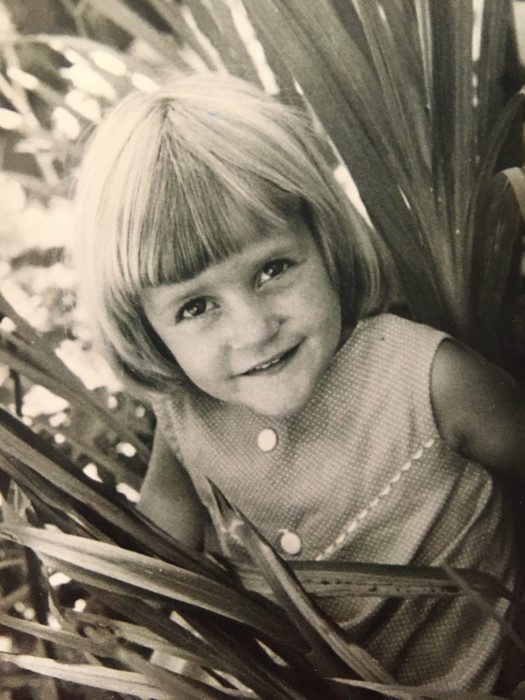
Childhood photo
When did you start to think about making a change in midlife?
In my mid-forties, I was working part-time as a shiatsu massage therapist at a holistic clinic in Evanston, while caring for our three kids. Most of my clients were affluent, and I was just not getting the job satisfaction that I had been hoping for in this field. As I listened to the “problems” many clients faced, I found myself thinking that these are just rich people problems. I wanted to work with people who had more “real” problems, whatever that meant, and I was also looking for some way to expose my children (entitled suburban kids) to the realities of the world.
I looked long and hard for volunteer opportunities that we could do as a family. Many places would not take children as young as mine were at the time, but I finally stumbled upon RefugeeOne (Interfaith Refugee and Immigrant Ministries, as it was called then) on a volunteer website. I called and they invited us to join a Thanksgiving celebration they were having for the refugee kids. We went along and I knew immediately that that was where I was supposed to be. I remember being up all night after the event thinking about ways that I could contribute. The next day I signed us up to do family mentoring and myself to help with an ELT class (English Language Teaching).

My kids, Chris and Anna, with the kids of a Somali family we mentored
What is your next act?
I am the Director of Resettlement for RefugeeOne, the largest refugee resettlement agency in Chicago. Our mission is to provide opportunities for refugees fleeing war, terror, and persecution to build new lives of safety, dignity, and self-reliance. We provide all the services needed to successfully integrate into life in the USA. These services include case management, employment, English classes, computer classes, mental health services, youth programs, mentorship, medical case management, and immigration services. The biggest challenges for resettlement in Chicago is finding affordable housing and employment.
We resettle about 500 refugees a year. Most recently, the largest number of our clients are from Syria, Burma, Iraq, and Congo. In 2017, we had hoped to be resettling up to 9000 in the US, but the election changed everything. The number of US refugee arrivals has been cut from 110,000 to 50,000 for this year, which drastically reduced the number of refugees we will be resettling in Chicago. Coupled with Executive Orders actually shutting the refugee program down for 120 days and limiting the countries from where refugees can arrive, the US refugee program is facing new and serious challenges.

Senator Dick Durbin visiting our RefugeeOne office
In my position, I now oversee the case management program, seniors program, medical case management program, cultural orientation, housing program, intensive case management program and the women’s program.
I love everything about the job. I am able to help people who have faced incredible challenges to get to the USA, and their challenges are far from over when they arrive. Living in the USA is not easy, and there are multiple hurdles to overcome, but I am able to help in many small ways, guiding refugees through the many hurdles they face. It doesn’t take much to change someone’s life and I am fortunate to be able to do this every day.
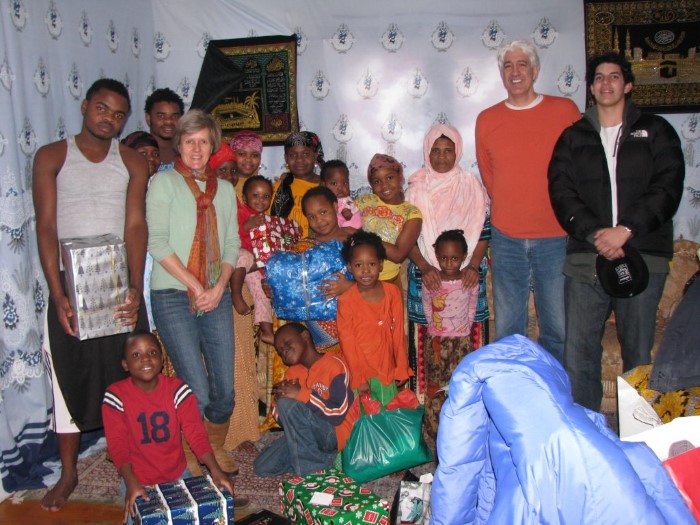
Sharing holiday gifts with a Somali family
How did this you go from volunteering to working for RefugeeOne?
I began as a mentor. I started with a single mother from Liberia. She had fled civil war and was bringing up three children by herself. Life was very challenging for her, especially as she had severely arthritic knees and could barely get herself up the stairs. I worked with her on getting a double knee replacement, rehabilitation at the Rehab Institute of Chicago, and got her on her feet again. My family was also matched with a couple of different Somali families that had had all fled Somalia in 1991 and had spent many years in refugee camps in Kenya. We worked on English and had lots of fun with the families at the beach, downtown Chicago, at soccer games, and more.
After mentoring various families and women, and teaching part-time at the ELT class, I was offered a position as Women’s Program coordinator at RefugeeOne. I took it immediately. I was responsible for arranging various events, classes, and the mentorship program. After two or so years, I was offered the position of Adjustment Program Manager, overseeing the case management staff and other services offered to refugees upon arrival. I was recently promoted to Director of Resettlement.

Orientation, teaching how to use a mop
How hard was it to commit to this new work?
It was the easiest decision I have had to make. I was ready to do something different and accepted immediately. I had been home with my kids until they were in middle school and knew that I was ready to do something for myself. Massage therapy was not providing me all I needed, so when this opportunity fell at my feet, I jumped right into it. It was scary at first, I had many self-doubts about how I would do, could I do it, would I make mistakes etc. But I knew I had to give it a try.
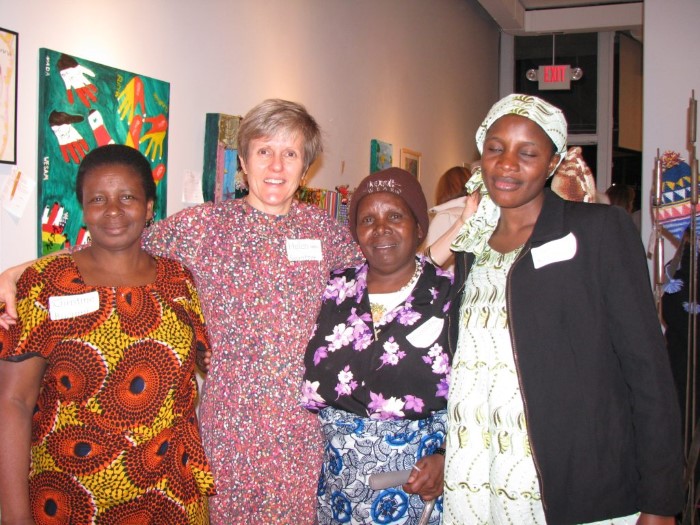
Exhibiting our clients’ artwork, with Burundian ladies
How supportive were your family and friends?
They were all very supportive and encouraging. When we were matched as a family with a few families from Somalia, my kids enjoyed getting to know the Somali children and teaching them English and the ways of American children. They have helped out since then with a variety of things including clothing drives, school supply drives, transporting clients to various appointments, and airport pick-ups. It has definitely opened their eyes to life outside the North shore suburbs of Chicago and made them appreciative of the privilege they were born into.
My husband offers his time and resources whenever needed. He has two businesses, a painting company and an adventure travel company (www.nwpassage.com). He recently offered our staff an evening kayak paddle, which was great fun. He has donated time and paint to various painting needs we have had, and continues to welcome any opportunity to help RefugeeOne and our clients.
Friends have helped out in so many ways. Whenever I have needed something—a bicycle, clothing for a family that arrived with nothing, extra furniture, car seats, the list goes on and on—all I have to do is put out an email blast and I get everything I need delivered to my garage. They have given financial donations, attended our annual benefit, and are always available to help out with anything I ask.

Family trip to New Zealand
What challenges have you encountered?
One challenge is time. While I am very good with time management, the lives of refugees do not end at 5 pm, and responsibilities do creep into after-hours time. This is the nature of my work; it is not a job for a clock watcher. My phone is always on, and I am happy to respond to client needs after hours.
The time issue has crept into our family’s love of travel. Since my husband runs an adventure travel company, he likes me to travel with him. Having a full-time job suddenly meant I was not as available to do that. Time off was now limited and had to be carefully planned. This took some getting used to. I was also suddenly not available to pick up sick kids from school, take the dog to the vet, all those sorts of things. Luckily my husband works close to our home, so when he was home, he took over. When he was gone, I had to call on friends.
A huge problem is that the US refugee resettlement program is underfunded. It always has been, and probably always will be. We do the best we can with what we have. Community support in Chicago is amazing; we work with many congregations who provide co-sponsorship for a family. They raise $8,000 and collect all the household items needed to furnish an apartment. They provide mentorship and friendship to our families, and we are blessed to have them all be a part of our mission.
Despite these challenges, I never have thought of quitting. I couldn’t imagine not working, and especially not doing something as fulfilling as what I am doing. The ability to change lives on a daily basis keeps me going through the most challenging of days.

Field trip to Garfield Park Conservatory with Bhutanese ladies
What did you learn about yourself through this process? Would you have done anything differently?
I would rather be working and crazy busy than sitting home. I am just not cut out for playing paddle tennis and doing lunch. Looking back, I would have done a Master’s in forced migration or international studies. And I would have kept up my high school French.
What advice do you have for women seeking reinvention in midlife?
What makes you feel most alive? What touches your soul? What has kept you up at night excitedly churning ideas of what you could do? What makes me cry the most is when I see the generosity of the human spirit. I knew that I had to do something that makes me give 100% of myself.
Think of the books you chose to read, the movies you chose to watch. I always seemed to pick books and movies about human struggles, war, rebellion, genocides—cheerful things like that! I wanted to be able to understand the struggles others have gone through as my life has been so blessed.
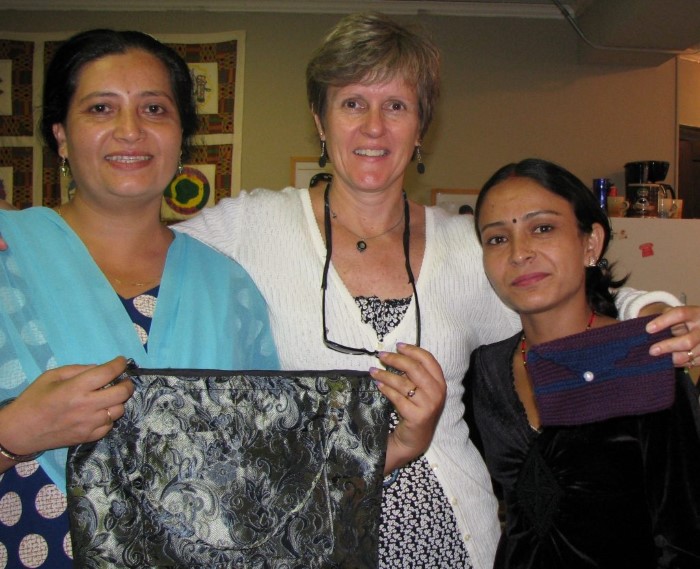
Sewing class
What advice do you have for those interested in learning more about the plight of refugees?
UNHCR, the UN Refugee Agency is a wonderful website to learn about current refugee issues. There is just so much information on the web available nowadays.
If you are really interested in studying the refugee situation in depth, I would recommend a Masters in Forced Migration. There are various schools offering this around the world. DePaul University in Chicago offers this program.
I also recommend these books:
The Middle of Everywhere: Helping Refugees Enter the American Community – Mary Pipher
Outcasts United: The Story of a Refugee Soccer Team That Changed a Town – Warren St. John
Of Beetles and Angels: A Boy’s Remarkable Journey from a Refugee Camp to Harvard – Mawi Asgedom
A Long Walk to Water: Based on a True Story – Linda Sue Park
Dangerous Sanctuaries: Refugee Camps, Civil War, and the Dilemmas of Humanitarian Aid – Sarah Kenyon Lischer
The Other Side of the Sky: A Memoir – Farah Ahmedi
The Lost Boys of Sudan: An American Story of the Refugee Experience – Mark Bixler
The Spirit Catches You and You Fall Down: A Hmong Child, Her American Doctors, and the Collision ofTwo Cultures – Anne Fadman

Cooking class
How can my readers get involved with RefugeeOne?
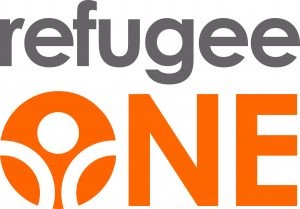 Start as a volunteer. That way you don’t have to commit too much until you are sure it is right for you. Working with refugees can be very challenging for a variety of reasons. Not speaking a common language makes communication difficult. When I was a mentor, I wanted to fix all the problems and issues that the refugees had, but had to learn quickly that I could not do that. Being a good volunteer means being flexible, open to new cultures, willing to share of yourself, being comfortable with being uncomfortable, and being creative in solving problems. There are many volunteer positions available, and they are listed on our website.
Start as a volunteer. That way you don’t have to commit too much until you are sure it is right for you. Working with refugees can be very challenging for a variety of reasons. Not speaking a common language makes communication difficult. When I was a mentor, I wanted to fix all the problems and issues that the refugees had, but had to learn quickly that I could not do that. Being a good volunteer means being flexible, open to new cultures, willing to share of yourself, being comfortable with being uncomfortable, and being creative in solving problems. There are many volunteer positions available, and they are listed on our website.
Connect with Helen Sweitzer
Email: hsweitzer@refugeeone.org
RefugeeOne Twitter: @Refugee_One
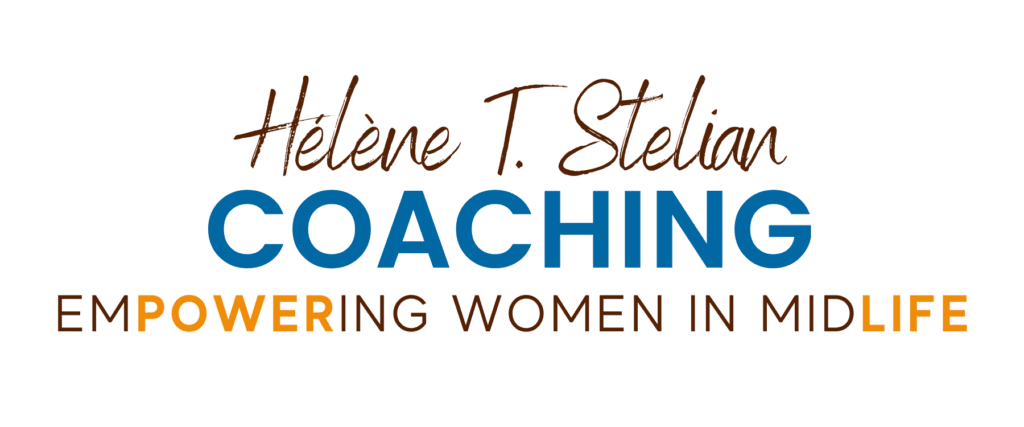
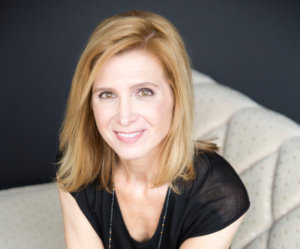
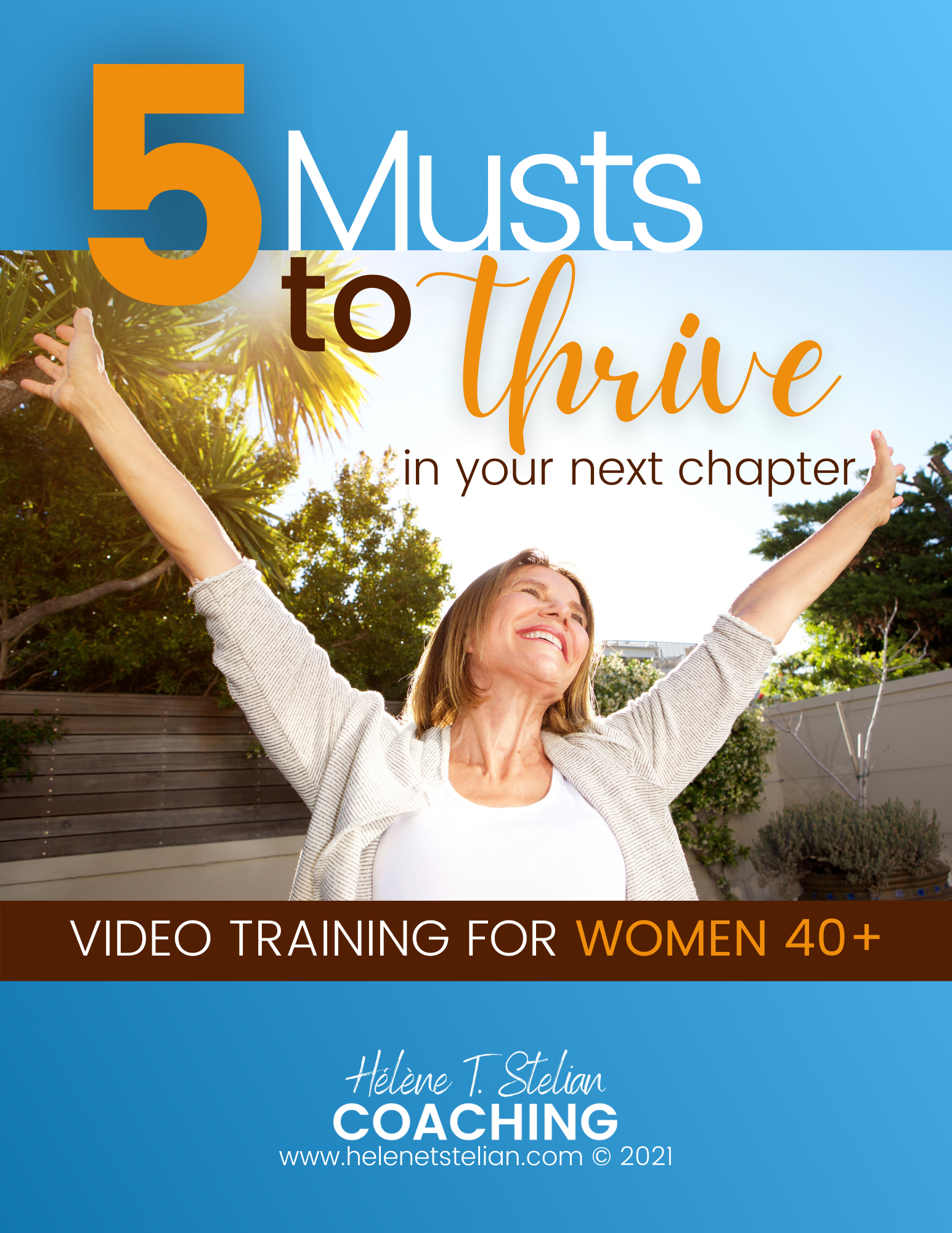



Helen’s life is very inspiring. I don’t live in the Chicago area, but am going to look out for opportunities close to where I live to help out. I lived in Kenya and South Africa for 14 years – both our kids were born in Africa. Unfortunately I find I have gotten caught back up in “being American” and not serving the way I used to. Thanks for sharing this interview!
Helen is inspirational! Adapting rather than assimilating to American culture and tasks is an ongoing issue with many refugees.
I love that this was a family commitment and not just Helen’s passion.